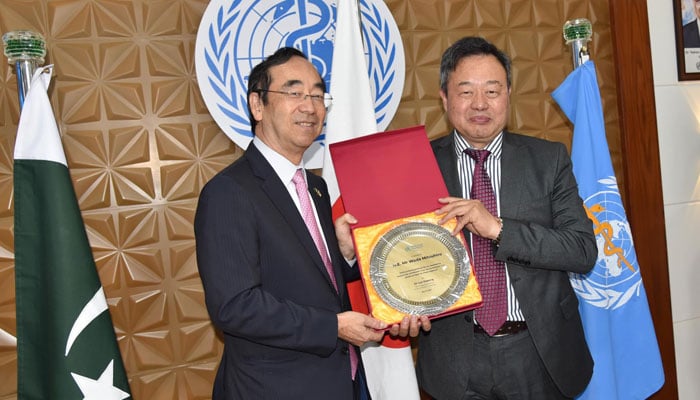WHO celebrates completion of healthcare infrastructure revitalisation project
Islamabad: The World Health Organisation's Pakistan Mission celebrated the successful completion of the 'Rebuilding Together' project with a ceremony here on Friday, appreciating the Japanese support for revitalising healthcare infrastructure in the country's flood-stricken areas.
The WHO's representatives highlighted the importance of international partnerships in building resilient healthcare systems. Dr Luo Dapeng, WHO Head of Mission in Pakistan, praised the government and people of Japan for the "remarkable" support to the project.
“We are extremely grateful for the invaluable support from the Government and people of Japan. Their generous contribution has been instrumental in restoring access to essential healthcare for vulnerable communities affected by the floods. This collaborative effort exemplifies the importance of international partnerships in building resilient healthcare systems,” he said.
He said the WHO was committed to working with the Pakistani government and other stakeholders to further strengthen the country's healthcare infrastructure. Japan's ambassador Wada Mitsuhiro reaffirmed his country's commitment to universal health coverage and sustainable development.
"We [the government of Japan] are committed to 'leave no one’s health behind' to achieve universal health coverage. Global health is central to Japan’s development cooperation, and we consider it to be the fundamental pillar of sustainable development,” he said.
In 2022, Pakistan faced catastrophic monsoon rains that caused widespread flooding, affecting millions of people in all provinces of Balochistan, Khyber Pakhtunkhwa, Punjab, and Sindh, according to officials.
They said the disaster led to the displacement of over 600,000 individuals, damage to 1.9 million homes, and significant agricultural losses. The officials added that the flooding also severely impacted the healthcare infrastructure, with more than 2,000 health facilities damaged.
The WHO's representatives said thanks to the financial support from the Japanese government and people, the WHO was able to respond promptly to disease outbreaks and improve access to essential healthcare by revitalising damaged facilities.
They said through a collaborative effort, the WHO has renovated 462 healthcare facilities, providing essential equipment and supplies, with 240 facilities rehabilitated through Japanese assistance.
"These facilities are now managed by government health authorities, ensuring continued service provision. Additionally, we have invested in building the capacity of local healthcare professionals, enabling them to provide sustainable healthcare services, including disease surveillance and outbreak response," a WHO representative said.
-
 AI Film School Trains Hollywood’s Next Generation Of Filmmakers
AI Film School Trains Hollywood’s Next Generation Of Filmmakers -
 Royal Expert Claims Meghan Markle Is 'running Out Of Friends'
Royal Expert Claims Meghan Markle Is 'running Out Of Friends' -
 Bruno Mars' Valentine's Day Surprise Labelled 'classy Promo Move'
Bruno Mars' Valentine's Day Surprise Labelled 'classy Promo Move' -
 Ed Sheeran Shares His Trick Of Turning Bad Memories Into Happy Ones
Ed Sheeran Shares His Trick Of Turning Bad Memories Into Happy Ones -
 Teyana Taylor Reflects On Her Friendship With Julia Roberts
Teyana Taylor Reflects On Her Friendship With Julia Roberts -
 Bright Green Comet C/2024 E1 Nears Closest Approach Before Leaving Solar System
Bright Green Comet C/2024 E1 Nears Closest Approach Before Leaving Solar System -
 Meghan Markle Warns Prince Harry As Royal Family Lands In 'biggest Crises' Since Death Of Princess Diana
Meghan Markle Warns Prince Harry As Royal Family Lands In 'biggest Crises' Since Death Of Princess Diana -
 Elon Musk Weighs Parenthood Against AI Boom, Sparking Public Debate
Elon Musk Weighs Parenthood Against AI Boom, Sparking Public Debate -
 'Elderly' Nanny Arrested By ICE Outside Employer's Home, Freed After Judge's Order
'Elderly' Nanny Arrested By ICE Outside Employer's Home, Freed After Judge's Order -
 Keke Palmer On Managing Growing Career With 2-year-old Son: 'It's A Lot'
Keke Palmer On Managing Growing Career With 2-year-old Son: 'It's A Lot' -
 Key Details From Germany's Multimillion-euro Heist Revealed
Key Details From Germany's Multimillion-euro Heist Revealed -
 David E. Kelley Breaks Vow To Cast Wife Michelle Pfeiffer In 'Margo's Got Money Troubles'
David E. Kelley Breaks Vow To Cast Wife Michelle Pfeiffer In 'Margo's Got Money Troubles' -
 AI-powered Police Robots To Fight Crime By 2028: Report
AI-powered Police Robots To Fight Crime By 2028: Report -
 Everything We Know About Jessie J's Breast Cancer Journey
Everything We Know About Jessie J's Breast Cancer Journey -
 Winter Olympics 2026: What To Watch In Men’s Hockey Today
Winter Olympics 2026: What To Watch In Men’s Hockey Today -
 Winnie Harlow Breaks Vitiligo Stereotypes: 'I'm Not A Sufferer'
Winnie Harlow Breaks Vitiligo Stereotypes: 'I'm Not A Sufferer'




